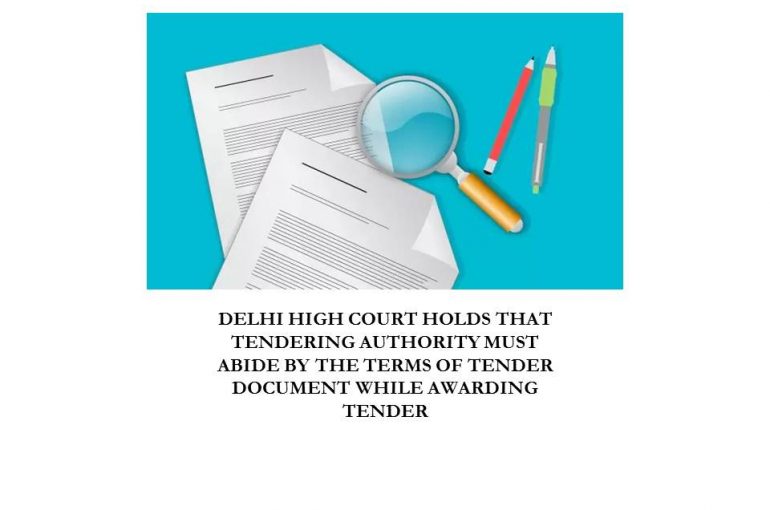DELHI HIGH COURT HOLDS THAT TENDERING AUTHORITY MUST ABIDE BY THE TERMS OF TENDER DOCUMENT WHILE AWARDING TENDER
A Division Bench of the Hon’ble High Court of Delhi comprising of Justice Vipin Sanghi and Justice Jasmeet Singh passed a Judgment dated 01-06-2022 in the case of Cjdarcl Logistics Ltd. versus Rites Ltd and Others W.P.(C) 10369/2021 and CM Nos. 31899/2021 & 33396/2021 and held that a Tendering Authority must comply with the terms and conditions of the Tender Document and should not award the tender in an arbitrary and discriminatory manner.
In the present case, Rites Ltd. (Respondent No.1) floated an E- Tender dated 30-08-2021, for engagement of freight forwarder for transportation of export project (cargo consisting of 34 nos. Passenger Coaches ex. MCF, Raebareli, UP and approx. 200 CBM of spares ex. MCF) from Raebareli, UP/RITES Warehouse, Delhi via Mumbai Sea port to Maputo Sea Port, Mozambique on Cost, Insurance and Freight (CIF) basis. The Petitioner, a Company engaged in the business of logistics and transportation of goods across India by road and rail participated in the said Tender. Clause 2 of the Tender Document provided certain grounds for disqualification, even for those bidders who may otherwise meet the qualification criteria as laid down in the Tender Document.
The case of the Petitioner is that Respondent No.3 who was declared as L1 bidder was liable to be disqualified, as they were banned by the Ministry of Defence vide Letter dated 04-03-3021 for one year w.e.f 19-02-2021, and by M/s Food Corporation of India, Vijayawada vide the Banning Order dated 30-03-2021 for a period of 5 years. However, Respondent No.1 awarded the Tender to Respondent No.3.
The Petitioner averred that Respondent No.3 deliberately suppressed the said two Banning Orders, and submitted a false declaration as per clause 2 of the Tender Document. The Respondent No.1 being aware of the said suppression by Respondent No.3, still cleared the technical bid of the Respondent No.3 and declared them as the L1 bidder in contravention to their own tender conditions and proceeded to award the Contract to Respondent No.3.
Aggrieved, the Petitioner first made a Representation before Respondent No.1 on 10-09-2021. Thereafter, the representatives of the Petitioner-Company also met the Technical Director and officiating Chairman cum Managing Director (CMD) of Respondent No.1 on 13-09-2021 and 15-09-2021 respectively, but to no avail.
Aggrieved and dissatisfied, the Petitioner- Company preferred a Writ Petition before the Hon’ble Delhi High Court and averred that Respondent No.3, by making a false declaration and by suppressing the correct position, had illegally secured the Contract, to the detriment of the Petitioner and public interest. To this, the Respondents filed their Counter Affidavits. Respondent No. 1 contended that that the Contract was already awarded to the Respondent No.3 on 06-09-2021, whereas the Petitioner had preferred its Representation on 10-09-2021. The Respondent No.3 presented three Orders showing that there was no blacklisting in force against them, when they submitted their bids and that there were no misstatements and misrepresentations made by them.
The question that arose before the High Court was “Whether respondent No.3 has furnished false and selfserving undertakings in the declaration form, and if so, whether the furnishing of the correct information would have lead to its disqualification in terms of Clause 2 of the qualification Criteria?”
The Bench after perusing the facts of the case and the arguments advanced by the Parties to the dispute held that Respondent No.3 clearly concealed the information about its blacklisting, and that the Respondent No.1, without any application of mind, awarded the said Tender to them completely contrary to the Tender conditions. “When respondent No.1 has laid down the tender conditions, including the grounds for disqualification, it is bound to enforce the terms and conditions without discrimination and favoritism. The respondent No.1 cannot disregard its own terms and conditions, and it would be strictly held to the standards laid down by it.”
“46…..It is well settled that the tendering authority must comply with its own terms and conditions. Once respondent No.1 learnt that respondent No.3 was liable to be disqualified under the terms and conditions, it could not have proceeded to award the contract to respondent No.3 in an arbitrary and discriminatory manner. The petitioner was found to be technically qualified. The respondent no.1 could have proceeded to award the contract to the petitioner, but it could not have awarded the same to respondent No.3.”
“48. Since we have found that respondent No. 3 stood disqualified in terms of Clause 2 aforesaid, respondent No.3 cannot seek to derive any monetary benefit from the contract in question, since it was squarely guilty of suppression of relevant and material information from respondent No.1, and by doing so, it gained an unfair and undue advantage of being adjudged the L1 bidder, and of being awarded the contract.”
Since the Contract was of Rs 125 Crores and considering the fact that Respondent No.3 would have at least made 10% profits, the Court directed the Respondent No.3 to deposit the entire amount of Rs. 12.5 Crores with the Registrar General of the Delhi High Court within 2 weeks from the date of the Judgment. The Respondent No.1 was also directed to pay cost of Rs 25 Lakhs to the Petitioner for improper due diligence in awarding the Tender to Respondent No.3. With these directions, the Petition was disposed of.
Suchitra Upadhyay
Associate
The Indian Lawyer & Allied Services
Edited by
Sushila Ram Varma
Chief Consultant
The Indian Lawyer & Allied Services





































Leave a Reply